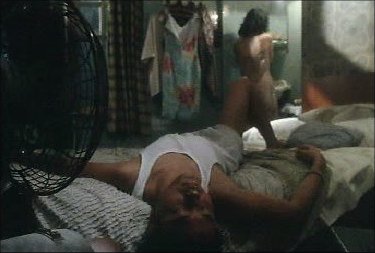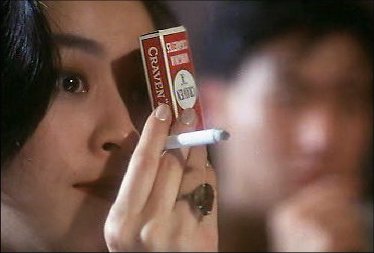|
Text and layout © Ed Shum, 2003. Ed Shum asserts the moral right to be identified as the author of this work |
|
Long Reviews |
|
Review and analysis of Days Of Being Wild |
|
After his directorial debut in the acclaimed and commercially successful As Tears Go By, Wong Kar Wai’s future as a director was assured. It was barely conceivable though, at that point, that WKW would later become Hong Kong’s premier auteur, with movies which would defy convention, challenge and enthral, cultivating a style, method of execution, and vision which would become singularly distinctive, almost as though a genre in itself. What was even more surprising was that WKW chose only his second movie as director to make clear his intentions, his vision, in a move which could easily have backfired on him and ended his cinematic career prematurely. |
|
Review of Days Of Being Wild (1990) |
|
|
|
[Page 1] |
|
End |
|
In fact, that film, Days Of Being Wild, did fail spectacularly at the Hong Kong box office, confirming to many that the domestic audience’s tastes weren’t tickled by ‘art’ films. However, this did not bury WKW. Despite commercial failure (and with a top notch cast too) critics were fascinated, and this kept WKW in contention: stars were still queuing up to work with him, bankable stars being enough for WKW to establish his own production company, Jet Tone, and continue with his ventures. And continue WKW did, in the same spirit as Days: determinedly ‘arty’, often shooting with schedules which last aeons by Hong Kong standards, often going without script, seemingly freeform. The result is that WKW found respect and acclaim as a cinematic visionary, fans of world cinema ensuring him cult status. Despite commercial performance being varied (particularly in his domestic market), he found his niche and went from strength to strength. |
|
Days is a period drama, harking back to the start of the 1960’s, set in a Hong Kong very different to the one today. At its heart Days is the story of a youth, Yuddy (played by Leslie Cheung), an archetype of recklessness and restlessness whose life consists of starting and ending relationships, drifting aimlessly yet searching, impulsiveness and violence regularly featuring in his character. The Chinese title refers to ‘The True Story of Ah Fei’ - ‘Ah Fei’ being the archetype summed up by Leslie’s character - but WKW clearly wants a depiction beyond what the public already know - after all, the Chinese title is deliberately the same as that given to the Hong Kong release of Rebel Without A Cause. WKW therefore toys with the preconception of the reckless youth, and then looks into the deeper questions of why such a character exists. |
|
The very first scene has WKW staking out his intentions and direction, serving as a striking encapsulation of Leslie’s mode and persona. The first thing we hear is his shoes clattering with utter confidence as he moves in on his ‘target’; bored and unsuspecting Maggie Cheung, who is working at the SCAA stadium selling snacks. The very aura of the echoing, ringing footsteps contrasts with most Hong Kong movies, where the dubbed on sound is usually barely disguised, and the opening shots are often geographic to give a sense of setting. What WKW does is to thrust the viewer immediately into following Leslie, just like the characters who end up following him. We are made curious as to who he is, a man who appears to stride with such purpose. What follows is a classic seduction cranked to extremes: he sweeps aside any repression of emotion Maggie may have, asks of her name, tells of her name, then asserts to her that, ‘tonight you will dream of me’. His manner is so clear, executed in such outrageously blatant fashion, that one cannot help but be fascinated. |
|
It is not long before he does seduce Maggie. WKW makes her job appear the absolute epitome of boredom: the ever-present ticking of the clock in the background, the absolute lack of any other life whatsoever - we only see a snippet of this, as the film jumps to Leslie’s next visit, but we are never anything less than convinced of how absolutely nothing is happening in her life. Leslie brings to her the concept which then colours all relationships in the film - time, and how this is allied to memory. In his ‘one minute’ speech, he encapsulates the irrecoverable nature of time; but not as a condition of loss - he deems himself and Maggie to be ‘one minute friends’ - something which time makes an incontrovertible, immutable truth. And it is this formation which WKW has concentrated on. But from here, we jump straight to the ending of the relationship, suggesting that WKW is uninterested in their togetherness. Instead, as impulsively, casually and outrageously as before, Leslie unilaterally concludes the relationship. |
|
Brief encounter: Leslie pulls off a magnificent performance as the cool yet insecure playboy, Yuddy |
|
Before Leslie has moved on to his next lady, brassy nightclub girl, Carina Lau, we learn something of his background: the connection with his stepmother, Rebecca Pan, glimpses of violence and protectiveness. It is in the context of this violence that he meets Carina, who is instantly in awe of his fiery nature. There is nothing revolutionary in connecting violence and sex, but WKW cleverly allows the neutral token of the pair of earrings to supply a surface reasoning for the characters’ actions - Leslie beats the toyboy to get him to return his stepmother’s earrings, which Carina picks up. However, it is clear that such surface reasoning is only to mask the inner desires of the characters. Squealing with defiance, Carina says she is not ‘easy’, but this is no barrier for Leslie. In seducing her, Leslie’s charm is laced with latent malice, and the resultant relationship reflects this. We also see Jacky Cheung, Leslie’s friend who clearly wants to be like Leslie. But Jacky is the reckless youth archetype turned on to its own neuroses: he is a loser, a wannabe. Simply asking Carina’s name, and watching her dance, he falls for her, but being no Leslie he can’t have her. In the end, he tries to take Leslie’s place, failing miserably and ending up with nothing. |
|
One of the most interesting relationships in the film is that between Leslie and his stepmother. Early on we learn that she adopted Leslie, and that he resents her for telling him of this. This drives his search for his natural mother, a quest conducted always in a confrontational manner, more in anger than in love. Why does he need to know one may ask? WKW toys with an underlying concept of identity here: the existence of Hong Kong as a point of transience is indisputable, and this is reflected in various characters having come from outside the territory, or with a view to leaving it. There is an essential rootlessness which is apparent in many WKW characters, and this comes across as both a freedom from encumbrance, and a state of wayward loneliness. These characters seldom impart to us any relationships which are automatic, taken for granted, and so the few relationships they do form have obsessive significance, and become the crux of existential dilemmas. |
|
Page: |
|
Page: |

